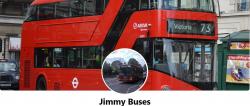By Abigail Pollock
Across London Covid-19 has radicalised London bus drivers. A new generation of garage-based unions reps is beginning to call for more action and more strikes but is Unite united with its own grassroots?
Back in March, many Londoners began to observe a gruesome new ritual: checking social media each day to figure out how many bus-drivers had died overnight. For the estimated 30%, of working Londoners who use one of the 673 bus every day, their regular route and its drivers are the first human contact that day. With many stations closed and cars off the road, the determination of London bus drivers to keep London moving was applauded by Londoners.
A minute’s silence for Covid deaths
On the 27th April, Workers Memorial Day, Unite the Union issued a video praising keyworkers, but it refused to support the bus drivers at Stratford who wanted to leave their cabs and observe a minute’s silence for the 30 drivers who had already died in the pandemic. Furthermore, the bus companies were not so keen on their workers new status as the “heroes of transport” as were the public. Far from acknowledging the estimated 50 deaths in service, with extra pay or improved health and safety, drivers’ terms and conditions have been under attack during Covid as the revenue to Transport for London(TfL) has fallen away.
By June, with the 12 bus companies failing to break even, TfL was forced to apply for a £1.6bn pay-out that could be recouped through huge cost-cutting measures by the operators. It was around this time, that the Metroline company first issued notice to drivers that it would be trialing a new system for drivers clocking-in to work. Remote sign-on had been mooted before the crisis, but now it would be piloted and rolled-out in record time. Instead of reporting to an allocated garage, each driver would now be responsible for making their own way to a bus-stop, in their own time, at which point they would be required to clock-in using their own mobile-device.
Deterioration in status
For the last few years Unite has been aware of the deterioration in the status and pay of bus drivers, but the complex licencing system whereby drivers are employed by franchises rather than the regulatory public body (Transport for London) has made it virtually impossible to negotiate effectively for the industry. Each company is keen to undercut its competitors and routes and contracts are horse-traded with bewildering frequency. Career drivers are becoming rarer and rarer and casual labour jumps from company to company. Most of all, regular drivers claim that over the last five years the union has become almost invisible in the garages.
But by the late Summer, a new militancy grew as Londoners began to eat, drink and work across the capital again. A comment by Fiona Bruce on BBC News, that drivers are low-skilled, came at just the same time as many drivers were beginning to talk about a fightback. By late August one hundred percent of Harrow bus garage had voted (on a 90% turnout) to go on strike. Archway and Tottenham followed right behind. Unfortunately, conclusive ballots sometimes have a habit of leading to very little action by Unite.
Network never lets us down
Compared to Tube drivers, the London bus network never lets us down, but the vagaries of the licence means companies always seem to outwit the drivers and their reps: Unite is seen by drivers to lack the bite of the RMT. Back in February, Unite allegedly even pulled their sick and exhausted industrial action, so as not to damage Sadiq Khan’s chances in the mayoral elections.
But London buses are a ticking time-bomb. Twenty-four London garages and a workforce of 24,500 can and will bring London to a standstill if mass walkouts occur. Radical reps and radical garages like Leyton have a long history, whereas TfL was only established in 1999. This week a final round of balloting will take place and although the Trade Union Bill of 2016 makes strike action harder to realise, there is a real push from the ground.
Jimmy buses
According to James, a Facebook sensation who blogs under the name of ‘Jimmy Buses’ and who has become notorious for his plain-speaking videos from on the road, bus drivers worked longer hours in the pandemic and suffered a loss of earnings. “We are fatigued and tired, and now we have remote sign on. Our pay and terms and conditions are constantly being attacked. We need the mayor of London to refuse a bailout in October and force the government to re-nationalise the buses, or we face possible route and service cuts and job losses. We need our union to stand up and fight for us. We need the trade union act to be redressed. We are being let down everywhere and it has to stop now”.
Unrealistic revenue expectations
Put simply, this might be a make or break moment for Unite and unionised drivers. The big companies like Arriva, Go-Ahead and Metroline, are losing money every day. TfL’s payback strategy relies on totally unrealistic revenue projections. All it will take is one massive London-wide bus strike and we could see TfL’s Achilles Heel, the essential artery that is buses, choke the lifeblood out of the whole of London’s privatised surface transport service. Could it be the big old red London bus that will break Boris’s stranglehold on London?
Follow Jimmy Buses on Facebook here.
September 21, 2020



